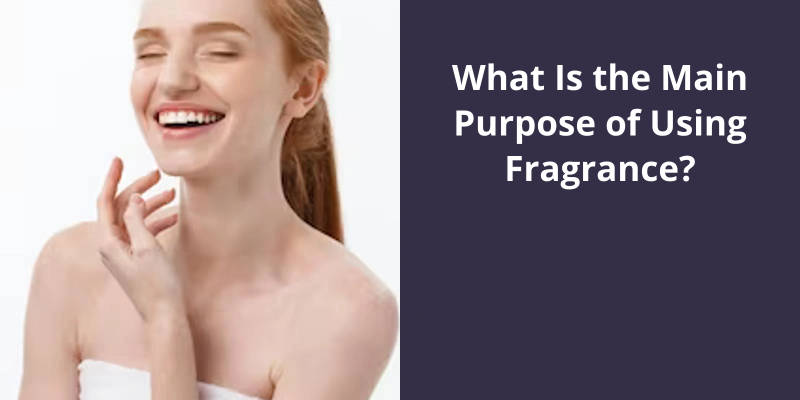Have you ever wondered why there’s sometimes a strong chemical scent in certain perfumes? Well, the mystery lies within the intricate process of fragrance creation. As perfumers meticulously craft complex scent compositions, they often rely on a combination of natural and synthetic ingredients to achieve the desired olfactory experience. These chemicals, while essential for creating unique and long-lasting fragrances, can sometimes emit a strong odor that some individuals may perceive as overpowering or chemical-like. In this article, we will delve deeper into the world of perfume chemistry to understand why these scents occur and how they affect our olfactory senses.

Why Am I Suddenly Allergic to My Perfume?
Have you ever wondered why you suddenly find yourself allergic to your favorite perfume? It may come as a surprise, but the average perfume contains approximately 14 chemicals that have the potential to trigger an allergic reaction. Consequently, individuals with asthma or other respiratory illnesses are particularly susceptible to this fragrance allergy.
There are several common ingredients found in perfumes and fragrances that can cause such reactions. Citronella, known for it’s use as an insect repellent, is one such culprit. This ingredient may induce skin irritations or respiratory issues in sensitive individuals. Similarly, oak moss, often used for it’s woody notes, has been associated with allergic contact dermatitis. It’s worth noting that the European Commission has restricted it’s use due to it’s potential to cause allergies.
Another problematic ingredient is balsam of Peru, which is derived from the Myroxylon balsamum tree. While it may add warmth and depth to a perfume, it can trigger allergic reactions such as skin redness, swelling, or even respiratory problems. Lastly, synthetic components used in the creation of perfumes, such as synthetic musk or aldehydes, have been linked to allergic reactions, including headaches, skin irritation, or respiratory distress.
Overall, if you suddenly discover that you’re experiencing an allergic reaction to your perfume, it’s essential to identify the specific component that’s causing the issue. Avoiding products containing these trigger ingredients could prevent future allergic reactions. In cases of severe allergies, seeking medical advice is advised.
How to Choose Hypoallergenic or Fragrance-Free Alternatives to Perfume
- Research the ingredients
- Look for products labeled “hypoallergenic” or “fragrance-free”
- Avoid common allergenic ingredients like fragrance, parabens, and sulfates
- Read customer reviews and recommendations
- Test the product on a small patch of skin before using it all over
- Check if the product is dermatologist-tested or recommended
- Consider natural or organic options
- Avoid products with added dyes or artificial colors
- Choose unscented or lightly scented options
- Consult with a dermatologist or allergist for personalized recommendations
Individuals who experience sensitivity to perfumes often have a unique immune response that treats the ingredients in perfumes as a threat. This immune system reaction can result in itchiness or a rash as the body tries to combat the perceived invader. It’s important to understand the causes behind perfume sensitivity in order to address and manage the symptoms effectively.
What Causes Sensitivity to Perfumes?
When it comes to sensitivity to perfumes, it’s essential to understand that the bodys reaction is primarily triggered by the identification of an ingredient in the perfume as a foreign substance. This recognition prompts the immune system to initiate an inflammatory response, similar to how it would combat bacterial or viral invaders. This process typically takes a few days to develop fully and often presents symptoms such as itchiness or a rash.
The cause of this sensitivity can vary greatly from person to person. For some individuals, it may be due to a specific ingredient or combination of ingredients in the perfume. Certain chemicals commonly used in fragrances, such as aldehydes or musk compounds, have been known to trigger allergic reactions in susceptible individuals.
Furthermore, it’s worth noting that allergic reactions to perfumes aren’t limited to the skin. Some individuals may experience respiratory symptoms such as coughing, sneezing, or even difficulty breathing when exposed to certain fragrances. This highlights the importance of being mindful of others sensitivities and the potential impact perfumes can have on those with allergies or respiratory conditions.
By identifying the specific triggers and taking appropriate precautions, such as avoiding certain ingredients or opting for fragrance-free alternatives, it’s possible to minimize the discomfort and adverse effects associated with perfume sensitivity.
How to Identify and Avoid Ingredients in Perfumes That May Cause Sensitivity
If you’re experiencing sensitivity to certain ingredients in perfumes, it’s important to identify and avoid them to prevent any discomfort. One way to do this is to carefully read the product labels and look for specific ingredients that you know trigger your sensitivity. Common culprits include synthetic fragrances, alcohol, and certain essential oils like jasmine or rose. Opting for fragrance-free or hypoallergenic perfumes can help reduce the risk of encountering these irritants. Additionally, testing a sample of the perfume on a small patch of skin before applying it liberally can help determine if you’ll have any adverse reactions. Lastly, consulting a dermatologist or allergist for guidance can provide further insight and specific recommendations tailored to your sensitivity to ensure a more pleasant perfume experience.
Perfume, known for it’s distinct and lingering scent, holds a surprising secret: it’s aroma can subtly transform throughout the day. The interplay between the heat of your skin, the surrounding atmosphere, and the volatile molecules in the fragrance causes a captivating evolution of scent. Ultimately, this phenomenon results in an ever-changing olfactory experience for both the wearer and those in their presence.
Does Perfume Smell Change Throughout the Day?
Perfume is a complex concoction of various aromatic compounds that combine to create a distinct scent. However, you may have noticed that the smell of perfume can change throughout the day. This phenomenon can be attributed to the interaction between the fragrance molecules and external factors such as skin temperature and ambient air conditions.
Moreover, the surrounding air temperature plays a crucial role in how perfume smells throughout the day. Hotter temperatures can cause the fragrance molecules to evaporate more quickly, intensifying the scent. Therefore, your perfume scent may be more prominent and long-lasting on a hot summer day compared to a chilly winter afternoon.
Higher humidity levels can amplify the scent of perfume, making it more potent and long-lasting. On the other hand, drier air tends to dilute the fragrance, making it less pronounced.
The individual chemistry of your skin can also impact how perfume smells on you. The unique combination of oils, pH levels, and bacteria present on your skin can interact with the fragrance molecules, creating a personalized scent. This interaction can alter the composition of the perfume and result in a different aroma than what you may perceive from the bottle or test strip.
These factors interact with the fragrance molecules, causing shifts in the intensity, longevity, and character of the scent.
Perfume can be a delightful accessory for some, but for those with asthma, allergies, or other respiratory disorders, it can become an unbearable source of discomfort. The presence of fragranced products like perfume can trigger sensitivities and lead to various symptoms such as headaches, nasal congestion, and breathing difficulties. To alleviate these issues, individuals may need to take measures to remove, block, or avoid the offending substance in order to protect their respiratory health and overall well-being.
Why Can’t I Tolerate Perfume Smell?
For some individuals, the pleasant aroma of perfumes can turn into a distressing experience. It isn’t uncommon for people with asthma, allergies, or other respiratory disorders to find it difficult to tolerate the smell of perfumes. The chemicals found in these fragranced products can trigger unwanted reactions and symptoms.
Preventing fragrance sensitivity is crucial for those who experience these reactions. The best way to approach this is by removing, blocking, or avoiding the offending substance. This can be achieved by selecting fragrance-free products and opting for natural alternatives. Additionally, using air purifiers or ventilation systems can help to reduce the concentration of irritating chemicals in the air.
It’s important to note that fragrance sensitivity can vary from person to person. Some individuals may be more susceptible to these reactions than others. Furthermore, it’s crucial to consult with a healthcare professional if you suspect you’ve fragrance sensitivity or if you experience severe symptoms when exposed to perfumes or other fragranced products.
Taking precautionary measures, such as using fragrance-free products and improving indoor air quality, can help prevent fragrance sensitivity and alleviate symptoms.
Common Chemicals Found in Perfumes That Can Trigger Fragrance Sensitivity
Fragrance sensitivity, also known as perfume allergy or fragrance intolerance, is a condition where individuals experience adverse reactions to certain chemicals commonly found in perfumes. Some of the common chemicals that can trigger fragrance sensitivity include:
- Aldehydes: These organic compounds often added to perfumes for a fresh or fruity scent can cause headaches, skin irritation, and difficulty breathing in sensitive individuals.
- Musk compounds: Used to give perfumes a lingering scent, musk compounds can cause allergic reactions such as skin rash, itching, and respiratory problems.
- Phthalates: These chemicals are commonly used as a fixative in perfumes, helping the fragrance to last longer. However, phthalates have been linked to hormonal disruptions and can cause respiratory issues and skin irritation in some people.
- Linalool and Limonene: These naturally occurring substances found in essential oils can cause skin sensitization and allergic reactions when present in higher concentrations. They’re often used as fragrance ingredients in perfumes.
If you experience symptoms like headaches, sneezing, coughing, skin irritation, or difficulty breathing when exposed to perfumes or scented products, it’s possible that you’ve fragrance sensitivity. Avoiding perfumes with these common chemicals and opting for fragrance-free alternatives could help alleviate your symptoms.
This can be frustrating for perfume lovers, as their favorite scent may not always smell the same way on different days. However, understanding the influence of hormones on our sense of smell helps explain these variations in fragrance perception.
Why Does My Perfume Smell Different on Different Days?
Our bodies are complex ecosystems, constantly in a state of flux. Our hormones play a significant role in regulating various bodily functions, including our sense of smell. It’s fascinating to think that the same fragrance can smell entirely different on different days, but it all boils down to our hormonal fluctuations.
Hormones are chemical messengers that circulate in our bodies, influencing our moods, behaviors, and even our perceptions. Changes in our hormone levels can alter the way our brain processes olfactory information, ultimately affecting how we interpret scents.
Perhaps youve noticed that during certain times of the month, particularly during menstruation or ovulation, your favorite perfume smells slightly off. This is because hormonal shifts during these phases can heighten or dampen our senses, making certain notes in the fragrance more prominent or less noticeable.
Additionally, stress levels can also impact our sense of smell. When were stressed, our bodies produce high levels of cortisol, impacting the sensitivity of our olfactory receptors. As a result, the same perfume that usually brings us joy might suddenly seem overpowering or unappealing.
Moreover, lifestyle factors such as diet and medication can further complicate the equation. Certain foods or medications can interact with our body chemistry, altering the way fragrances are perceived. For example, spicy foods or medications with strong odors can temporarily mask or modify the scent of a perfume.
Embrace the uniqueness and variability of your sense of smell, as it makes your journey through the world of fragrances all the more interesting and personal.
Taking proper care of your perfumes is crucial in ensuring they maintain their original scent and quality. Storing them in favorable conditions is essential, as exposure to sunlight and heat can cause the fragrance to alter. Over time, you may notice brown thickening, an indicator that the perfume is going bad. Nevertheless, it’s advisable to wait until you genuinely detect significant changes in the smell before deciding to discard them.
Why Is My Perfume Smelling Weird?
Do you ever find yourself questioning the unusual scent coming from your beloved perfume? It’s not uncommon for perfumes to emit strange or different odors over time. One of the reasons for this is improper storage. Perfumes should always be stored in a dry, dark, and cool place. Exposing them to sunlight and heat can alter their composition and thus impact their smell.
Moreover, it’s important to note that perfumes shouldn’t be stored in cold environments either. Extreme cold temperatures may cause the fragrance to become cloudy or even solidify, leading to changes in the scent. So, finding the perfect balance when storing your perfume is key to preserving it’s original fragrance.
As time goes on, you might notice your perfume thickening and turning brown. This is a sign that the perfume is starting to go bad. However, it’s essential not to jump to conclusions and dispose of your perfumes too hastily. Sometimes, fragrances can evolve naturally over time, maturing and enhancing certain notes. Therefore, it’s crucial to pay attention to any noticeable changes in scent before making a decision.
Additionally, the quality of the perfume itself can play a role in the way it smells. Inferior quality ingredients or improper mixing during the production process can result in a peculiar or chemical-like odor. It’s always advisable to invest in reputable perfume brands to ensure a more consistent and pleasant fragrance experience.
If you start smelling chemicals in your perfume, it might be due to various factors. Inadequate storage conditions, exposure to sunlight and heat, quality of ingredients, and the natural maturing process can all contribute to changes in scent. Remember to store your perfumes in an optimal environment and judge any alterations in fragrance thoughtfully before deciding to replace them.
Conclusion
In conclusion, the presence of chemicals in perfume can be attributed to the complex formulation and composition of these products. However, the perception of chemicals in perfume can vary greatly among individuals, as some may be more sensitive to certain ingredients than others. Factors such as individual body chemistry, application technique, and the concentration of certain chemicals can also influence the perception of scent. Additionally, increased regulation, transparency, and education within the fragrance industry can help address concerns and provide consumers with a better understanding of the chemicals used in perfumes.





